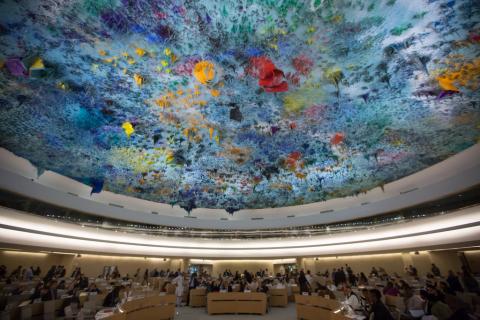
On March 29, 2018, Alkarama submitted its shadow report ahead of Saudi Arabia’s upcoming Universal Periodic Review (UPR) before the UN Human Rights Council. The UPR, which is held every four to five years, is a peer-review mechanism during which UN Member States assess each other’s human rights records and make recommendations based on the principles enshrined in the Universal Declaration of Human Rights. In November 2018, Saudi Arabia will be reviewed under this mechanism for the third time.
Ahead of the review, non-governmental organisations are invited to provide information which can be referenced by any of the states partaking in the interactive discussion. In its report, Alkarama assesses the implementation of recommendations accepted by Saudi Arabia during its previous UPR, and also reflects on the significant deterioration of human rights in the country since 2013.
The report highlights that despite economic projects including “Vision 2030” and recent superficial reforms to grant women the right to drive and attend sports stadiums, fundamental civil and political rights continue to be systematically violated and denied.
Failure to ratify fundamental human rights treaties
Despite commitments made during the 2013 UPR, Saudi Arabia has still not ratified some of the most fundamental human rights instruments such as the International Covenant on Civil and Political Rights (ICCPR), the International Convention for the Protection of All People from Enforced Disappearance (ICPPED) or the Optional Protocol to the Convention against Torture (OPCAT).
Furthermore, the report notes that during its UPR in 2013, the Saudi Arabian government accepted a recommendation to bring its criminal system into line with international standards by promulgating a penal code and amending the Code of Criminal Procedure (CCP). However, to date, no steps have been taken towards fulfilling that commitment. The lack of a codified penal code means that there is no clear definition of what qualifies as a crime, while also allowing judges to charge individuals retrospectively.
Arbitrary Detention
The practice of arbitrary detention remains systematic and widespread in Saudi Arabia. In numerous cases documented by Alkarama, the security forces and intelligence services have carried out arrests without warrants, and without informing individuals of the reasons for their arrest. Individuals are held in prolonged custody without access to a lawyer or their family, subjected to torture, and denied the opportunity to challenge the legality of their detention. Others are released after months or even years without charge or any judicial procedure, or sentenced to lengthy prison terms or the death penalty.
In recent months, the practice of arbitrary detention peaked, with 200 public figures, activists, scholars, businessmen and members of the royal family arrested between September 2017 and January 2018 under the pretext of “fighting corruption” and/or “protecting national security”.
During this latest crackdown, the Cybercrime Law of 2007 has been increasingly employed to silence those who express criticism on social media, with article 6 stipulating that that individuals can be handed a five-year prison sentence for “publishing material impinging public order, religious values, public morals, and privacy”.
Human rights and counter-terrorism
The 2017 Law on Combating Terrorism and its Financing (Anti-Terrorism Law) contains an extremely vague definition of terrorism. As a result, it criminalises a wide spectrum of acts falling under the right to freedom of opinion, expression, peaceful assembly and association as well as the right to freedom of thought, conscience and religion.
Furthermore, the Specialised Criminal Court (SCC), an exceptional court with jurisdiction over cases of terrorism, has repeatedly targeted dozens of human rights defenders for simply criticising the authorities or demanding basic rights.
Recommendations
In its report, Alkarama recommended, among other things, that Saudi Arabia promulgate a criminal code and bring the CCP, the Anti-Terrorism Law and the Cybercrime Law into line with international human rights law. It also called on Saudi Arabia to eradicate the practice of arbitrary detention and afford individuals deprived of their liberty all fundamental legal safeguards and fair trial rights.
For more information or an interview, please contact media@alkarama.org (Dir: +41 22 734 1006).
